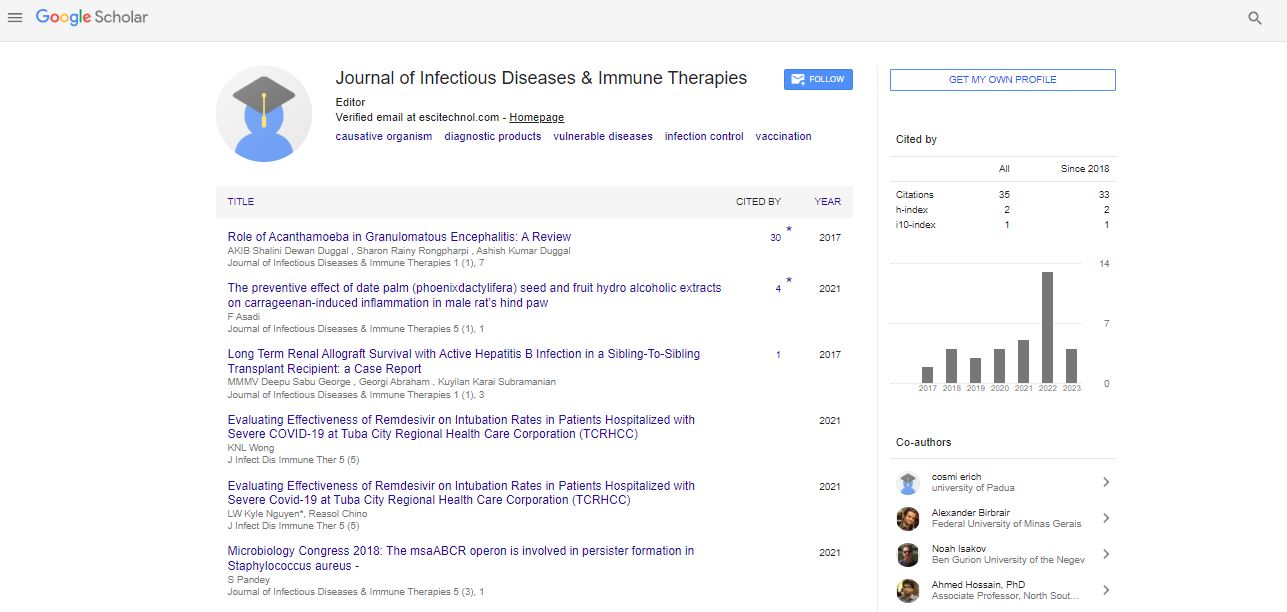Perspective, Vol: 12 Issue: 2
Chronic Infection: Unraveling the Complexity of Prolonged Disease
Chen Smith*
Department of Biological Sciences, University of Notre Dame, Notre Dame, IN, USA
*Corresponding Author: Chen Smith
Department of Biological Sciences,
University of Notre Dame, Notre Dame, IN, USA
E-mail: chensmith76@nd.edu
Received date: 27 May, 2023, Manuscript No. JIDITH-23-106353;
Editor assigned date: 29 May, 2023, Pre QC No. JIDITH-23-106353 (PQ);
Reviewed date: 15 June, 2023, QC No. JIDITH-23-106353;
Revised date: 23 June, 2023, Manuscript No. JIDITH-23-106353(R);
Published date: 30 June, 2023, DOI: 10.4172/2329-9541.1000342
Citation: Smith C (2023) Chronic Infection: Unraveling the Complexity of Prolonged Disease. J Immunol Tech Infect Dis 12:2.
Description
Chronic infections present a significant burden on human health, affecting millions of individuals worldwide. Unlike acute infections that resolve within a short period, chronic infections persist for extended durations, leading to long-term complications and posing significant challenges for treatment. This manuscript explores the multifaceted nature of chronic infections, highlighting the underlying mechanisms, immune responses, diagnostic strategies, and potential therapeutic interventions. By understanding the intricate interplay between pathogens and the host, we aim to shed light on novel approaches for managing and combating chronic infections.
Chronic infections are characterized by persistent and prolonged infection within the host, often lasting for weeks, months, or even years. These infections are caused by various pathogens, including bacteria, viruses, fungi, and parasites, which have developed sophisticated mechanisms to evade immune defenses and establish long-term residence. This section provides an overview of chronic infections, emphasizing their impact on human health and the need for comprehensive research and therapeutic strategies.
This section delves into the intricate mechanisms employed by pathogens to establish and sustain chronic infections. Topics covered include immune evasion, antigenic variation, intracellular survival, biofilm formation, latency, and quiescence. The discussion focuses on specific examples from different pathogenic organisms to highlight the diverse strategies utilized by chronic pathogens to evade immune clearance and maintain persistence.
The immune response plays a crucial role in combating infections. However, chronic infections often result from a delicate balance between pathogen persistence and immune control. In this section, we explore the complex interplay between the host immune system and chronic pathogens. We discuss the role of innate and adaptive immune responses, immune tolerance, exhaustion, and immunomodulation in the context of chronic infections. Furthermore, we highlight the challenges posed by immune evasion strategies employed by chronic pathogens.
Accurate and timely diagnosis is essential for effective management of chronic infections. This section reviews current diagnostic methods, including serological assays, nucleic acid-based techniques, imaging modalities, and novel biomarker identification approaches. Emphasis is placed on the challenges associated with diagnosing chronic infections due to their complex nature and intermittent pathogen presence.
Treating chronic infections presents unique challenges due to the long-term persistence of pathogens and their ability to develop drug resistance. This section discusses current treatment options, including antimicrobial therapy, immunomodulation, and combination therapies. Additionally, it explores emerging strategies such as targeted therapies, immune checkpoint inhibitors, and phage therapy. The potential of host-directed therapies and novel drug delivery systems for managing chronic infections is also examined.
In this final section, we highlight the need for continued research to address the challenges posed by chronic infections. We discuss potential future directions, including the development of new diagnostic tools, exploration of host-pathogen interactions, and the identification of novel therapeutic targets. By unraveling the complex mechanisms underlying chronic infections, we can pave the way for more effective prevention, diagnosis, and treatment strategies, ultimately alleviating the burden of these persistent diseases.
Chronic infections present a significant global health challenge, affecting millions of people worldwide. Understanding the intricate mechanisms of pathogen persistence, host immune responses, and developing accurate diagnostic methods are crucial steps towards effective management and treatment. By exploring innovative therapeutic strategies and investing in further research, we can mitigate the impact of chronic infections and improve the quality of life for affected individuals.
 Spanish
Spanish  Chinese
Chinese  Russian
Russian  German
German  French
French  Japanese
Japanese  Portuguese
Portuguese  Hindi
Hindi 